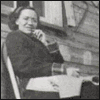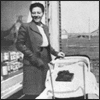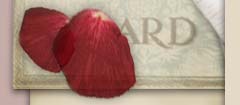Home > War Bride Stories > Anna (Perugini) Lavigne > Page 2 > Page 3 > Page 4
 |
| Click image for larger view. Anna with baby George in carriage on Shippegan's wooden sidewalks. Photo courtesy of Anna and Aurele Lavigne. |
 |
| Click image for larger view.Anna sitting on her father-in-law's back porch in Bathurst. Photo courtesy of Anna and Aurele Lavigne. |
 |
| Click image for larger view. Anna and baby George in carriage on the porch of Aurele's store in Shippegan. Photo courtesy of Anna and Aurele Lavigne. |
For the first eight years, she and her husband and their growing family lived in the tiny Acadian fishing community of Shippegan, where Aurele and his brother-in-law operated a general store. Shippegan became Anna's new "home" in Canada, and it's a place which she still holds dear to her heart. The women friends she met there are still "like sisters" to Anna.
Anna remembers with fondness the night in 1950 when her friend Mrs. Gauthier, the doctor's wife, had a surprise going-away party for she and Aurele before they left on their first trip back to Italy since leaving there in 1946. When they arrived at the Gauthier's home, the guests were all dressed up in Italian costumes. They gave her a beautiful pin, and she still has a memento of that evening, a ribbon and an Italian flag. "They were so wonderful," she says of her friends in Shippegan.
If there were other war brides in Shippegan or Bathurst, Anna never knew any of them. "It never crossed my mind," Anna says of the war brides. Her life was busy, she was in love, and she had a growing family to take care of. And even if there were other women from overseas who married Canadian servicemen, there was no time for war brides clubs in Anna's life.
When they returned from their trip to Italy, Anna and Aurele and the three children moved to Bathurst where Aurele opened a second store. Eventually, he left the business and worked in insurance while Anna stayed at home to take care of their own family, which eventually grew to five boys and one girl, George, Alphonse, Gaetano, Carl, Andrew and Elvira.
Anna quickly became involved in local community organizations in Bathurst, such as the hospital volunteers, the Knights of Columbus women's organization and the Catholic Women's League. As the children grew up Anna also followed their activities with interest. "That makes you accept your life here, " Anna says. "You see all these things, the children, the school, getting involved."
Getting involved was one way to grow roots in Canada, but another was accepting and adapting to life in your new country. "You have to accept, but you have to adapt too," Anna says. "You have to forget that you lived in Italy and let's say my father had a chauffeur and my mother had a maid or I could go out and buy what I wanted." And part of adapting is accepting that she chose to come to Canada to be next to her husband. Being with Aurele is her "way of life," Anna says firmly.
Despite the differences in culture and language, Anna never felt that she was treated differently. Although she still retains a distinctive accent, it sounds like it could be French so she blends in with the majority French-speaking population of Bathurst: "They used to notice my accent was different," Anna says, "They thought it was strange. But I never made a point of saying I was from Italy. If they wanted to know I let them ask me."
Fifty years later, Anna is confident in the decision she made as a young woman to leave Italy for a life on the north shore of New Brunswick. Despite the hardships of learning a new language and adapting to a new culture, she considers herself to be very fortunate. Her children are all grown up now, and she is very proud that they all have a university education.
"I consider myself very lucky. I was lucky in finding Aurele. He is such a good man. He doesn't drink, he's a family man, and well, we're very proud of our children. If it hadn't been for that, I would have done what many did years ago. They came here, saw it, and went back."
There is no doubt that Anna has been thoroughly Canadianized. When she goes back home to Italy now, she is reminded in thousands of ways how different the country has become, "Americanized" she calls it, and she compares the "ratrace" of Italy to the peace and quite of New Brunswick. "I love to go home, to visit my family, but I'll never live there. Canada is my home, my family is here, and I like it here."
Finally, as though to answer a question she is expecting, Anna says that people often ask her about her life as a war bride, and when they do they almost always ask if she would do it again. Her reply, as enthusiastic as they day she said "yes" to Aurele's proposal of marriage with the help of a dictionary, is a resounding, "100 percent! I was very, very fortunate. I was very, very lucky!"
Back to Top
|
 |






